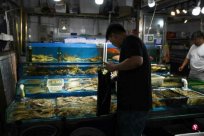After the Chinese Customs completely banned the import of seafood, a number of Japanese restaurants said that the ingredients were not imported from Japan.
China Customs announced on Thursday (August 24) that in order to prevent the risk of radioactive pollution caused by the Fukushima nuclear treatment of water row of water in Japan, the imported origin of imported origin as Japanese aquatic products will be fully suspended from now.The market is expected to have a wide influence on the catering industry. According to the number of public comments in the Chinese Catering Platform in June, there are 79,324 Japanese restaurants in China. It is the sixth cuisine. Before it, it was a local cuisine.
After the General Administration of Customs released the news, many Chinese Japanese shops said that the aquatic products of our shop were not imported from Japan.According to Red Star News, a number of Japanese restaurants in Beijing have stated that Japanese ingredients are almost no longer sold, and most of them are replaced by ingredients produced by waters around Russia or South Korea, Southeast Asia and other waters.
The Shanghai short video information website "Li Video" said that he called eight popular Japanese shops in Shanghai, of which seven of them said that the store had no imported products in Japan.
Most restaurants also said they are looking for seafood supply outside Japan.According to First Finance, Japanese restaurants at all prices in China have not high dependence on Japanese ingredients, but they are indeed looking for some new suppliers, and even some bosses have long been prepared.There is also a doubling of guests in the restaurant, because they are worried that seafood will be affected in the future, and take a meal first while temporary safety.
The report said that the channels for major retailers in Beijing have suspended the purchase of tuna in Japan, and the proportion of Japanese aquatic products is not high, and farming aquaculture will get more business opportunities in the future.In terms of catering, some aquatic products have doubled meals at the store, but for restaurants, they can basically find new suppliers even if they are not imported from Japan.
According to interface news, many restaurants have begun to seek products away from Japanese waters, such as Boston in the United States, Australia, etc.A shop owner said that tuna can be replaced by Spain, and sea urchin can be used to use Russia, North Korea and France.
At the same time, Chinese domestic ingredients have become sought -after. The Japanese store interviewed by First Financial Yimagazine generally stated that the price of Chinese ingredients increased by 20%to 30%.
For the taste of the ingredients, the staff of Beijing Huiling Pavilion Kaiseki cuisine said: "The quality of fish produced in Dalian waters, as well as the waters around Fujian, and the waters surrounding the region of Taiwan are actually not lost in Japan."
There are also Japanese -based shops that despite the change of ingredients, the passenger flow of Japanese stores has been greatly reduced due to concerns about "nuclear pollution".Owners of the mid -range Japanese restaurant in Guangzhou, who visited by the media "Time Finance", said that entering August, the passenger flow was reduced by 50%compared to June and July.
The owner of the shop said, "It has been notified since the end of June to prohibit the import of food in 10 counties in Japan. At that time, we took the initiative to stop using ingredients from Japan.%Of ingredients come from Japan, mainly sea urchin and tuna. At present, they have been replaced with sea urchins in Dalian and tuna in Boston. "
The per capita consumption of a family in Shanghai is 300 to 500 yuan (S $ 56 to 93).The Japanese shop said, "When it has not been determined (nuclear pollution water) to discharge the sea, the business in the store is not good. In the past two months, sales have fallen almost 20 %, and the situation may be worse in the future."


